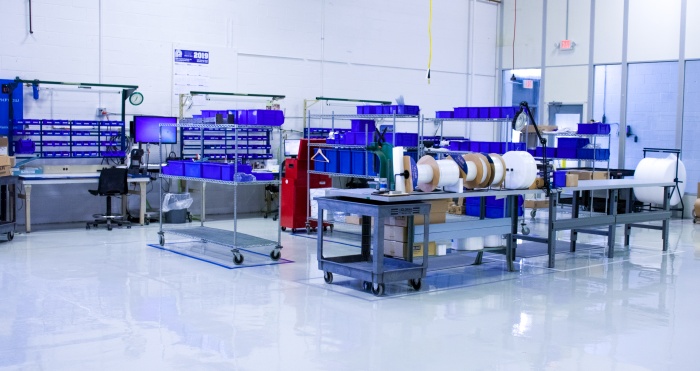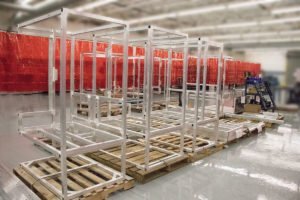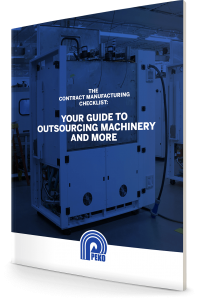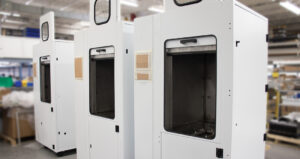Every year, my team and I give about 250 people a tour through our manufacturing plants. We’re talking about seasoned manufacturing vets, engineers, procurement folks, startup founders and students.
 Of course with industrial machinery manufacturing companies, we get a ton of great questions. It’s interesting to hear people’s thoughts and get a feeling for the level of knowledge that all the visitors have. Even more interesting is to hear the questions that they are asking.
Of course with industrial machinery manufacturing companies, we get a ton of great questions. It’s interesting to hear people’s thoughts and get a feeling for the level of knowledge that all the visitors have. Even more interesting is to hear the questions that they are asking.
One thing I’ve noticed from listening to customer questions is that there is a ton of mystery involved in how industrial machinery manufacturing companies operate. I hear questions about quality, operations, pricing, finances, machinery, engineering, and capabilities, to name a few.
For the most part, none of these questions jump out at me as they are all normal part of getting to know each other from a B2B standpoint. But today, I’ve plucked out a few topics that seem to be mysterious based on the questions and reaction I get from customers coming through the shop.
1. Most Industrial Machinery Manufacturers’ Marketing Materials Don’t Match Their Reality:
Doing a walk-around tour of industrial equipment manufacturing companies can take a while. On the small side, you are looking to be dealing with at least 30,000 square feet. On the large side, we could be talking well into the range of 500,000 or more square feet. It all depends on machinery type, industries, vertical integration, engineering, and host of other things. Yet and still, they’re all relatively large, not something you can fit in a local strip mall.
One thing that always surprises me is commentary on how big and clean our facility is compared to other industrial equipment manufacturers – not because I didn’t realize that it’s big and clean – but because I’ve worked so hard to show the size and cleanliness of our facility in our customer facing marketing materials. When pressed why they are surprised, I usually get one of two answers, the first being that they never actually looked at my materials and they were not prepared for what they were going to see. But the more intriguing answer I get is their…distaste…for how many contract manufacturers they’ve visited that were dirty, old, messy, or in general disarray.

From my position, sometimes I forget that manufacturing has a long history of being a dirty world, and frankly, it isn’t terribly hard to spend a weekend cleaning the shop for a spiffy Monday morning marketing photo shoot. I think about all the facilities I’ve visited over the years, and I’d say anecdotally the clean shops tend to be more successful and reflect an element of care and professionalism that a filthy shop does not. Regardless, manufacturing facility tours are an eye opener, and you can cut away a lot of marketing fluff by making a visit.
2. Majority of Revenue Only Comes From 1 or 2 Large Customers:
We’ve all seen it. It’s that slide, that webpage, that brochure that has all the logos of all the companies that your prospective new supplier has done business with. It gives credibility to the company and relevance to their offerings. But there is usually more to the story…
 In most industrial equipment manufacturers, if you ask about revenue share, you’re likely to notice that the company you are researching probably has a list of a dozen or maybe a couple dozen but come to find out that all the revenue comes from just one or two large customers.
In most industrial equipment manufacturers, if you ask about revenue share, you’re likely to notice that the company you are researching probably has a list of a dozen or maybe a couple dozen but come to find out that all the revenue comes from just one or two large customers.
This is common because once you do good work as a contract manufacturer, you’re typically favored for more jobs. The more this happens, the more that these large customers start to demand the best service and quickest turnaround.
It may be part of the business, but if not managed properly, you may find that you’re taking back seat to a “more important” customer. Even worse is that the big loud customer can put the vendor right out of business if they pull any work out. This could cause a crippling affect to the industrial machinery manufacturing company you’re working with and whatever business you are doing with them.
Now I’m not saying that it’s a bad idea to work with companies that have a nice-looking portfolio of credible customer, I’m saying that the wise thing to do is investigate further. Understand the portfolio risks and how it will affect both your business and the contract manufacturer’s business if things go awry.
3. The Possibility of Cost Sharing Is a Sensitive Matter:
We’ve talked a lot about Bill of Materials (BOMs) in previous blog posts. Every manufactured machine, equipment or device has a BOM that provides an outline for every part within the assembly. But when you go to get pricing from an industrial machinery manufacturer that’s acting as a CM for your equipment, they might not let you see the BOM, or at least not the costed BOM.

There are many instances domestically, and more often overseas, that the CM isn’t willing to share detailed pricing information. As you might imagine, this can cause a great deal of distrust. The parties should be working together to verify that the BOM is correctly sourced, the optimal vendors are chosen, the optimal manufacturing processes are selected and that the pricing is indeed correct. This includes sharing of markup and margin expectations.
Business models are different for everyone but sharing this information helps both parties build trust and get the best pricing possible. Of course, we understand that those are sensitive topics and too much granularity is not reasonable, but the customer should know exactly what is in the BOM and how pricing has been generated.
Black box pricing, in other words, pricing that is given as a single number without detail, is a methodology that builds expectation gap and sets a bad precedent for the build.
 Some of these may come as a shock to you, some not, and some might just be helpful hints as you vet a contract manufacturer. The truth is that none of these things have to be secrets, but more so a product of asking the right questions, thinking critically and having some industry knowledge to boot.
Some of these may come as a shock to you, some not, and some might just be helpful hints as you vet a contract manufacturer. The truth is that none of these things have to be secrets, but more so a product of asking the right questions, thinking critically and having some industry knowledge to boot.
If you’re looking for an industrial equipment manufacturing company to help build your next machinery, equipment or instrument product, use our Contract Manufacturing Checklist to help guide you and your team through the process.








